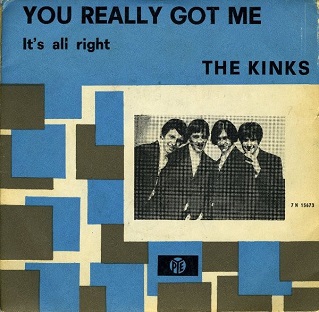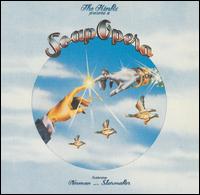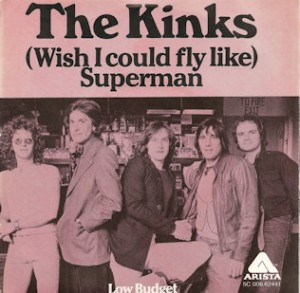
"You Really Got Me" is a song written by Ray Davies for English rock band the Kinks. The song, originally performed in a more blues-oriented style, was inspired by artists such as Lead Belly and Big Bill Broonzy. Two versions of the song were recorded, with the second performance being used for the final single. Although it was rumoured that future Led Zeppelin guitarist Jimmy Page had performed the song's guitar solo, the myth has since been proven false.

"Lola" is a song written by Ray Davies and performed by English rock band the Kinks on their album Lola Versus Powerman and the Moneygoround, Part One. The song details a romantic encounter between a young man and a possible trans woman or cross-dresser, whom he meets in a club in Soho, London. In the song, the narrator describes his confusion towards Lola, who "walked like a woman but talked like a man".

Soap Opera or The Kinks Present a Soap Opera is a 1975 concept album by the Kinks. It is the fourteenth studio album by the Kinks.

The Kinks were an English rock band formed in Muswell Hill, north London, in 1963 by brothers Ray and Dave Davies. They are regarded as one of the most influential rock bands of the 1960s. The band emerged during the height of British rhythm and blues and Merseybeat, and were briefly part of the British Invasion of the United States until their touring ban in 1965. Their third single, the Ray Davies-penned "You Really Got Me", became an international hit, topping the charts in the United Kingdom and reaching the Top 10 in the United States.

"All Day and All of the Night" is a song by the English rock band the Kinks from 1964. Released as a single, it reached No. 2 on the UK Singles Chart and No. 7 on the US Billboard Hot 100 chart in 1965. The song was included on the Kinksize Hits EP in the UK and the Kinks' second American album, Kinks-Size (1965).

Low Budget is the eighteenth studio album by English rock group the Kinks, released in 1979. Following the minor success of their 1978 album Misfits, the band recorded the majority of the album in New York rather than London. Unlike the more nostalgic themes of many Kinks albums prior to Low Budget, many of the album's songs allude to current events of the time. Musically, the album is a continuation of the band's "arena rock" phase, resulting in a more rock-based sound and more modern production techniques.

"See My Friends" is a song by the English rock band the Kinks, written by the group's singer and guitarist, Ray Davies. Released in July 1965, it reached number 10 on the UK Singles Chart. The song incorporates a drone-effect played on guitar, evoking a sound reminiscent of the Indian tambura.
"I'm Not Like Everybody Else" is a song written by Ray Davies and first recorded by the Kinks in 1966 and released that year as the B-side of "Sunny Afternoon". The lead vocal is sung by Dave Davies, with occasional parts vocalized by his brother Ray, the band's usual lead singer. The song is a defiant anthem of non-conformity. It has been covered by various artists, notably the Chocolate Watchband in their 1968 rendition of the song.

"Ev'rybody's Gonna Be Happy" is a song by Ray Davies, released as a UK single by the Kinks in 1965. As the follow-up to the number-one hit "Tired of Waiting for You", and having their previous three singles all chart among the top two, it was less successful, reaching number 17. It broke a run of what would have been thirteen consecutive top-ten singles in the UK.

"Come Dancing" is a 1982 song written by Ray Davies and performed by British rock group the Kinks on their 1983 album State of Confusion. The song was inspired by Davies' memories of his older sister, Rene, who died of a heart attack while dancing at a dance hall. The lyrics, sung from the perspective of an "East End barrow boy," are about the boy's sister going on dates at a local Palais dance hall.

Supersonic Rocket Ship is a single recorded by British rock band The Kinks, written by Ray Davies. It was released on 5 May 1972, in the UK, and in September of that year for its US release. 'Supersonic Rocket Ship' was also included as a track on the double LP Everybody's in Show-Biz, which was released on 25 August 1972, in the US and on 1 September in the UK. Everybody's in Show-Biz also yielded the song 'Celluloid Heroes', which, although not a hit, has become one of The Kinks' most popular songs.

"(Wish I Could Fly Like) Superman" is a song written by Ray Davies that was first released on the Kinks' 1979 album, Low Budget. The song, inspired by Superman: The Movie, employs a disco beat and lyrics that describe the singer's wish to be like the fictional character Superman. The song's disco style was created as a response to Arista Records founder Clive Davis's request for "a club-friendly record," despite Ray Davies' hatred of disco.

"State of Confusion" is a song written by Ray Davies and first released by The Kinks as the title track of their 1983 album State of Confusion. Although it was not released as a single in the United States, it reached #26 on Billboard's Hot Mainstream Rock Tracks chart. It was released as a single in Continental Europe.

"Sitting in My Hotel" is a song written by Ray Davies that was first released on The Kinks' 1972 album Everybody's in Show-Biz. It was also released on several compilation albums and as the B-side of the "Sweet Lady Genevieve" single. It is one of Davies' more introspective songs, musing about the cost of fame and stardom, and thus contributes to the album's theme of the difficulties of life on the road.
"Heart of Gold" is a song by the British rock band The Kinks. Written by Ray Davies, the song appeared on the band's 1983 album State of Confusion.
"Stop Your Sobbing" is a song written by Ray Davies for the Kinks' debut album, Kinks. It was later covered by the Pretenders as their first single.

"You Can't Stop the Music" is a song by the British rock band The Kinks. The song, appearing on the band's 1975 album Soap Opera, was written by the band's principal songwriter, Ray Davies.

"Ducks on the Wall" is a song by the British rock band the Kinks. The song, appearing on the band's 1975 album Soap Opera, was written by the band's principal songwriter, Ray Davies.

"Holiday Romance" is a song by the British rock band the Kinks. The song is on the band's 1975 album Soap Opera and was written by Ray Davies, the band's main songwriter.
"Big Sky" is a song by the English rock band the Kinks. Written and sung by Ray Davies, it was released in November 1968 on the album The Kinks Are the Village Green Preservation Society. While Davies has typically avoided providing a direct answer on the song's meaning, commentators often interpret it as describing God as unsympathetic towards the problems of humans.
















